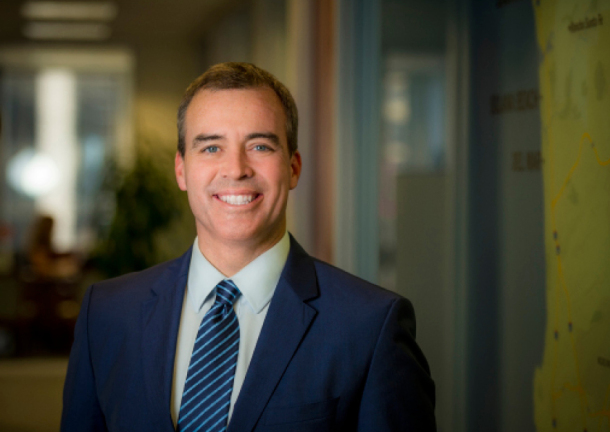Mark Cafferty is on the front lines of the worldwide battle for talent.
 As president and CEO of the San Diego Regional Economic Development Corporation, Cafferty knows all too well that the key to retaining and attracting companies is having workers with the most up-to-date skills for the most in-demand jobs.
As president and CEO of the San Diego Regional Economic Development Corporation, Cafferty knows all too well that the key to retaining and attracting companies is having workers with the most up-to-date skills for the most in-demand jobs.
“It all comes down to talent, no matter the industry sector,” Cafferty said.
Because having a well-trained workforce is so critical to ensuring a vibrant regional economy, Cafferty spends a lot of his time focusing on how to attract and train the talent in the San Diego region. It’s a job Cafferty comes by naturally as he spent much of his career devoted to helping people connect to the skills they need to obtain meaningful careers. Prior to his time at the San Diego Regional Economic Development Corporation, Cafferty served as the president and CEO of the San Diego Workforce Partnership, which oversees the region’s job-training programs.
A critical partner in all his workforce development efforts has long been UC San Diego Extension.
UC San Diego Extension, Cafferty explained, provides unique educational offerings designed to help highly educated workers stay current in an ever-changing economy by providing training for niche and in-demand skills.
“In a perfect world, you need your best academic institution to be part of the solution,” Cafferty said. “Time and time again, UC San Diego Extension has excelled at helping highly skilled people either reskill or up-skill to make a transition.”
When the aerospace and defense industry cratered in the early 1990s, UC San Diego Extension played a pivotal role in retraining San Diego’s workforce for new opportunities in the emerging innovation economy, he noted. UC San Diego Extension also broke new ground when it had the foresight to launch its Executive Perspective for Scientists and Engineers more than 30 years ago, helping train generations of local business leaders.
“That program helped build our telecommunications and biotech clusters,” Cafferty said. “Extension created technology executive leadership development programs long before everyone was trying to get into that space.”
When the Great Recession hit in 2008, UC San Diego Extension once again quickly stepped in to help retrain workers for new fields, such as the burgeoning health care information technology sector, Cafferty said.
“We have always been able to work with Extension to build programs quickly to fill a need that helps both the employer and the would-be employee,” he said. “In workforce development, the talk is always about being proactive. But the real key is to be reactive in the moment, and no one does that better than UC San Diego Extension.”
In his dealing with employers throughout the county, Cafferty said it’s clear they value what UC San Diego Extension offers to their companies. For instance, when ResMed was indicating it might leave for another metro area, Extension’s skill development and training helped convince the company there were the talent and resources to recommit to San Diego, he recalled.
A big reason why UC San Diego Extension has been such an important player in the local workforce development ecosystem, Cafferty said, is because of the leadership of Mary Walshok, associate vice chancellor of public programs and the dean of Extension.
“In all of our work on economic development, Mary’s reputation as a leader in this space goes a long, long way,” he said. “It’s an equalizer for us that the work of UC San Diego Extension has been so well recognized.”
When San Diego Mayor Kevin Faulconer recently formed his Workforce and Economic Development Advisory Committee, he chose Cafferty, Walshok and Constance Carroll, chancellor of the San Diego Community College District, to co-chair it.
Cafferty said the committee’s work is important because it focuses on providing training for the full spectrum of workers, from those who need basic skills just to get a job to high-skill workers who must retool to stay relevant in an ever-evolving workplace.
The need for training, even for highly skilled workers, became evident this summer when Qualcomm announced mass layoffs as it revamped its organization to better address the changing global market.
Cafferty said his organization has been working closely with Qualcomm to help the displaced workers find new jobs as well as provide the proper training for those new positions. He has no doubt UC San Diego Extension will once again be a critical component in helping many of those affected make the transitions to new careers.
“When a major economic shift happens, you need to know that your region is prepared for it,” Cafferty said. “UC San Diego Extension is a big reason why San Diego continues to be prepared and resilient.”